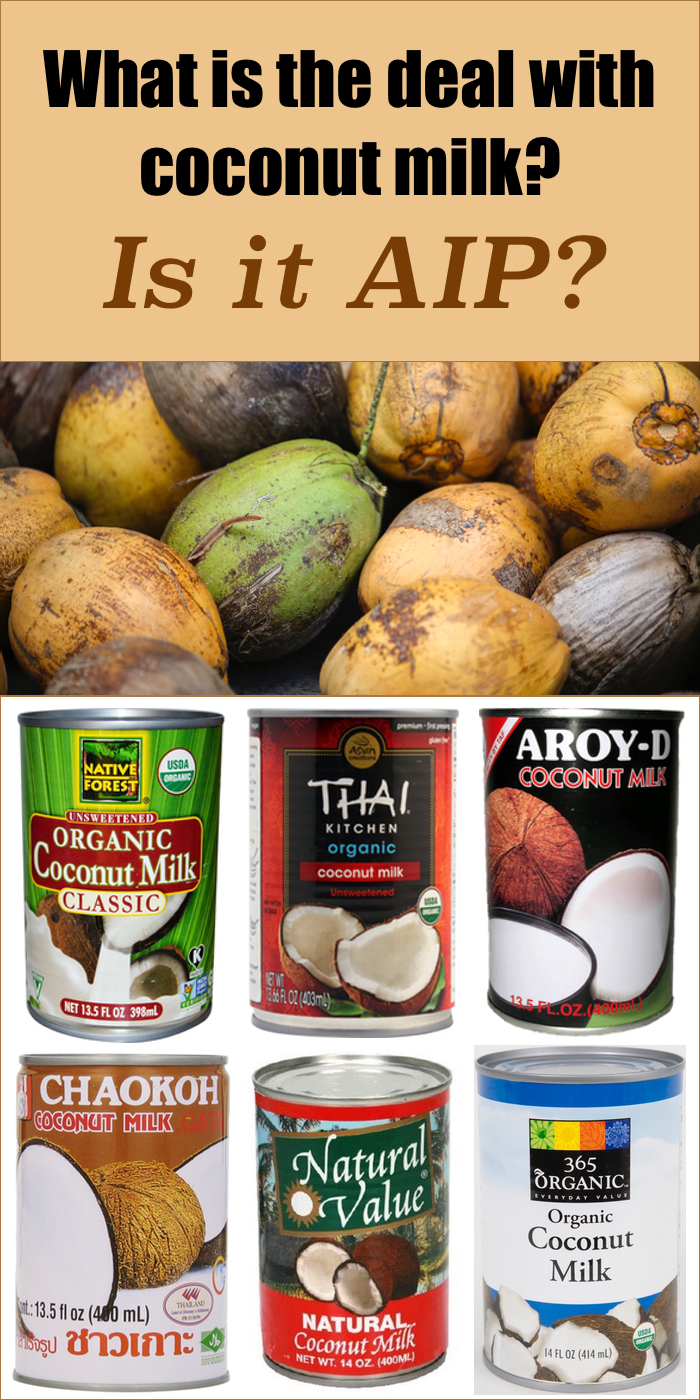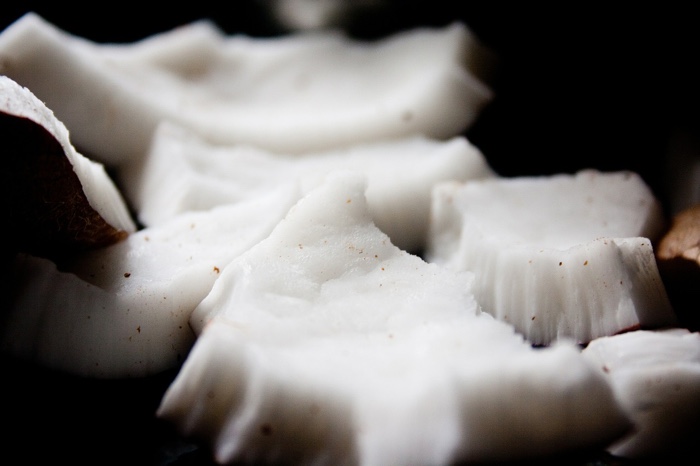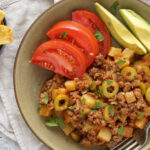 I love to use coconut milk
I love to use coconut milk when cooking and baking; it is a wonderful and nutritious alternative to traditional cows’ milk and heavy cream. For example, I use it in this crockpot recipe and this one. I use it in this broccoli mash to make it smooth and creamy. I also often use it in my desserts and snacks (see, for example, these chocolate truffles or this vanilla ice-cream).
However, all coconut milks are not the same! There are many different options available out there and some of them are just not compliant with the paleo autoimmune protocol. I investigated the matter, opened many cans of coconut milk, and I am sharing the results with you today!
» Is coconut a nut and is it AIP?
Let’s get this out of the way: coconut is not a true nut! Coconut is a member of the palm family, which is not related to tree nuts or peanuts. This explains why coconut and coconut products are allowed on the autoimmune protocol.
In botanical circles, coconut is called a drupe, which is a fruit in which an outer fleshy part surrounds a pit of hardened endocarp with a seed inside. The coconuts that you can find at your local grocery store have had their husk removed, which means that what you buy is the seed, and the white flesh and water are the inside of the seed. Other well-known AIP approved drupes are mangoes, olives, dates, apricots, cherries, nectarines, peaches, and plums.
» Is coconut milk good for you?
Yes! Coconut milk is an excellent source of vitamins, minerals, and antioxidants. Coconut also contains very healthful fats like saturated fatty acids and medium-chain triglycerides (MCT), which are both easily burned as fuel by the body. However, and this is where AIP folks need to be careful, coconut contains phytic acid and is high in inulin fiber (or high-fructose fiber). This means that coconut products can be consumed on the paleo autoimmune protocol, but in moderation for the highest-fiber coconut products (big quantities of inulin fibers can cause bacterial overgrowth).
Here is the recommended AIP breakdown:
coconut flour and coconut sugar = consume rarely / 1-2 tablespoons maximum
fresh coconut, coconut flakes, shredded coconut, coconut butter = consume more frequently / 2-4 tablespoons maximum
coconut milk = fine to consume / up to 1 cup per day
coconut oil = fine to consume without restriction
The reason why coconut milk is fine to consume on a daily basis is that most of the fiber has been removed by the preparation process, resulting in a much much lower FODMAP and phytic acid content. As for coconut oil, it is pure fat and does not contain any inulin fiber or phytic acid at all.
» Homemade coconut milk is the best if you have the time!
 I have a confession to make: I have never made my own coconut milk! I am already spending a great amount of time in my kitchen every day, cooking breakfast, lunch, and dinner for the family or developing new recipes for the blog. So if I can use a shortcut and buy quality coconut milk from the store, I go for it! I know for a fact that making your own coconut milk is super easy, though. Here are a couple of recipes from AIP blogger friends who are making their own:
I have a confession to make: I have never made my own coconut milk! I am already spending a great amount of time in my kitchen every day, cooking breakfast, lunch, and dinner for the family or developing new recipes for the blog. So if I can use a shortcut and buy quality coconut milk from the store, I go for it! I know for a fact that making your own coconut milk is super easy, though. Here are a couple of recipes from AIP blogger friends who are making their own:
- Creamy Coconut Milk by Mickey Trescott from Autoimmune Paleo
- DIY Coconut Milk by Petra Chambers-Sinclair from Petra 8 Paleo
» Are all coconut milks for sale in grocery stores and online the same quality?
If, like me, you choose to use a shortcut and purchase your coconut milk from the store or online, here are a few points to consider before you start shopping.
- Some coconut milks contain additives like guar gum or xanthan gum. These additives are used as stabilizers and/or thickening agents. Guar gum comes from the endosperm of the guar bean and xantham gum is secreted by a bacteria called Xanthomonas Camestris. Both guar gum and xantham gum have a high propensity for altering the gut microbiome and should be avoided on the autoimmune protocol.
- A vast majority of canned foods contain bisphenol-A (BPA) in their lining. It has been established beyond a doubt that BPA can leach into the food, potentially causing neurobehavioral problems, especially in infants and young children. While some companies make an effort to use BPA-free cans, they are still a minority today.
» Which brands of coconut milk are autoimmune protocol compliant?
are autoimmune protocol compliant?
If we take into account all that I have said previously, we have to eliminate all the brands of coconut milk containing additives like guar gum or xantham gum (because they are not AIP), which leaves us with a limited selection of products available in the United States. I am sure there are some brands available at local Asian markets, but these would not be accessible to everyone.
Here are the AIP compliant brands I was able to find on Amazon (no additives):
- Aroy-D
(only the tetra-pack is PBA-free, not the cans)
- Savoy
- Natural Value
(organic, PBA-free / grainy texture)
- Golden Star
(found also at Wal-Mart)
- Native Forest
(has a version without guar gum, organic, PBA-free / difficult to find)
» The controversy about Aroy-D coconut milk .
.
I have come across several articles and forums online in which some individuals were skeptical of the claims made by Aroy-D that their coconut milk doesn’t contain any additive (ie emulsifier). To support their opinion, they state that the texture achieved by Aroy-D coconut milk “looks and behaves like it contains an emulsifier” and “doesn’t separate”. Normally, if you let real coconut milk rest undisturbed, a separation occurs between the fat and the coconut water (especially if you leave it in the refrigerator). Many people reported that Aroy-D doesn’t separate the way it should, and thus suspect that there is a hidden emulsifier.
I have no way of knowing for sure what’s in a can of Aroy-D coconut milk so I will leave it to you to decide. The best course of action might be for you to give it a try and see if you experience any intestinal discomfort.
I tried the coconut milk from Aroy-D. I left the can in the refrigerator for 36 hours and when I opened it, I noticed that no separation between the fat and the water had occurred. The milk was still homogenous and smooth. I didn’t experience any noticeable digestive distress when I consumed it.
-The Paleo Approach – Reverse Autoimmune Disease and heal your Body by Sarah Ballantyne, PhD, (229-230)
–3 reasons why coconut milk may not be your friend by Chris Kresser







Hi Sophie, Thanks for a thoughtful post. You said you tried the Aroy-D coconut milk and didn’t have any intestinal distress. I’m wondering if you also tried consuming other coconut milks around the same time that do have guar and xanthan gums. The question is whether you are sure you are reacting currently to these gums, which would help you rule out the presence of gums in Aroy-D. Our guts change over time, thankfully, for those of us trying to heal.
Hello Elisabeth 🙂
No, I didn’t consume other coconut milks with guar gum at the same time. You know, I wrote about Aroy-D because I came across these discussions while researching different brands. Another possible theory that would justify the fact that Aroy-D is so creamy and doesn’t separate, would be that they use UHT process. I am not very well versed in this though. I figured, people will decide if they feel comfortable using Aroy-D, or not 🙂 Are you currently using that brand? How do you like it?
I don’t believe that Aroy-D is free of gums based on the way it retains its smooth consistency. I researched the brand a couple of years ago and corresponded with the importer who couldn’t tell me anything more than what was on the label. I don’t react to gums so for me the most important factor is that the milk is organic and free of contamination from the packaging. I highly recommend Wilderness Family Naturals organic coconut milk and cream which each have a small amount of xanthan gum mixed in, small enough that it doesn’t really keep the product from separating. It comes in 11 oz paper cartons and it’s great to stash in my checked baggage when I’m traveling.
Hello Elisabeth 🙂
It seems like Wilderness Family Naturals is a good option for you! Thanks for sharing your experience. People who are just starting on the autoimmune protocol should be careful though because guar gum has the potential to alter negatively the gut microbiome. It is definitely good news though that you do fine with it 🙂
Thanks so much for your follow up, Sophie! I was wondering if xanthan gum also alters the gut microbiome the same way guar gum does? Wilderness Family Naturals doesn’t contain guar gum. Appreciate all your research!
Yes Elisabeth, xantham gum has the same disruptive effect on the gut microbiome.
I use lots of ArroyD coconut milk so I think I should comment. I use the liter and 8.5 0z boxes. I use it in cooking for soups, gravies, candy, etc. I also make kefir with it and have found that while the kefir is on the counter it does separate. It also separates after I have used the stick blender on it and placed it in a glass bottle in the refrigerator. The amount of liquid that forms on the bottom is not very much maybe an inch or two but it is there which tells me there is no emulsifier in it.
Hello Judith,
Thank you so much for your feedback! I have noticed the same about Aroy-D as well after using it for a while. It will separate most of the time, but there is very little coconut water.
The sad thing is Trader Joe’s light coconut milk was my favorite. They had some issues with the quality and now we, here in Texas can’t get it anymore. They have said it will be back, but we just don’t know when 🙁
Hello Janette 🙂
That’s too bad! Don’t you hate it when you finally find a product you like, and then it is in back order or unavailable! Do you have another source maybe?
Hi Sophie:
Just so you know, in Canada I have purchased the Aroy-D and it does in fact separate quite nicely. I know that the Golden Star also separates, but not as well as the Aroy-D. Don’t know if they are produced differently for different markets, but doubt it! I’ve used both successfully in recipes, but am having a problem sourcing either one of them here in Florida now!?
Hello Louise!
Thank you for your feedback 🙂 So it seems that sometimes Aroy-D separates, sometimes not. I wonder what causes such differences! What’s your ‘trick”? They can both be purchased on Amazon.
Louise,
I live south of Tampa, and I have found the Golden Star brand at Walmart. That was a very happy day indeed! Good luck. 🙂
Hello Holly 🙂
I am glad you were able to find an AIP approved coconut milk in your neck of the woods! Small victories are sweet 🙂
I get mine from Amazon!
A note about Arroy-D is that not all Arroy-D coconut milks are made the same. Some have guar gum and some don’t. You always need to check the ingredients list! I have accidentally bought the ones with guar gum and now I always check before I buy to make sure I’m getting an Arroy-D cocconut milk without stabilizers.
Hello Vicky,
Thanks for your feedback! You are so right: always read the labels before buying!
When somebody tells you, he can reverse gravity, so let stones fly, do you believe him/her ?
Oil and water, do not mix , maybe a half an hour, but.. that’s it.
Coconut milk in fact is nothing more as natural coconut oils and fats, such as fast-burning MCT oil (medium chain triglyercides) and saturated fats, dissolved in water.
When it’s prepared via blending, the fat component (often called coconut cream) gets suspended in the watery component, and it appears to combine. But when left to sit undisturbed, the coconut milk will separate into two layers as the fat is hydrophobic.
Therefore additives are necessary, in this case emulsifiers together with stabilizers.
If not, the coconut milk will end with the huge layer of cream on top, and a greenish water layer at the bottom.
Coconut Cream/milk in one homogeny solution, without any additives, is as scarce as hen’s teeth !
Even the EU had to accept, the Codex Alimentarius Coconut Milk and Coconut Cream: Stan Codex 240 – 2003 was not agreed upon for nothing, so their additives law EU 1331-2008 had to be repaired with (EU) No 583/2012 of 2 July 2012 the necessity of this additive is recognized. ( see google.com )
Emulsifiers are chemical additives which cause the fatty and watery layers to stop separating from one another
So, when Aroy-D tells, they can mix water and oil… send a few samples to the national food authority / FDA and let them test, as.. for sure, somebody at Aroy-D has a complete different idea about additives.
As coconut milk manufacturers told me in Thailand: Oh only a very littlebit, and, below 2 % no need to declare ( as nobody will look for it ). Sorry, incorrect.
I buy the Native Forest Simple version at Whole Foods.
I get my Arroy coconut milk in the can from Amazon and I always wondered why it doesn’t separate and is so creamy. I found out that if I store my cans in the garage where it is colder than my refrigerator that the milk does indeed separate out. There isn’t much liquid, maybe 10-15% . It definitely separates out though. I live in Minnesota.
If you’re doing an update, TJ’s organic coconut milk ingredients are only coconut and water. Their website currently states that cans of coconut products are BPA free. No word about titanium dioxide.
Hi!
I’ve started AIP and noticed that coconut milk causes my chronic rosacea to flare. Any idea why coconut milk bothers me so badly? I’ve used Arroy-D. Thanks!!
I have been on AIP for about 1 year now and thought I was doing pretty well. But, I continue to find out that I have been eating things that can cause reactions, such as the additives in the coconut milk that I have been using this whole time as well as the rice starch in my vitamins.. I looked at your list and realized that I am using one that is on your AIP approved list, Native Forest Organic. However, on closer inspection of the ingredients it says there is organic guar gum. Are there other varieties of this brand that do not contain the guar gum?
Hello Rebecca,
Yes, Native Forest Organic has a version without guar gum, but it is difficult to find. Here is a link.
Renunka coconut block, looks like a little stick of white butter, sold in Asian shops, may find it in the fridge.
I think it is pure coconut. Hope this helps.
Hi! I’m wondering if there are any coconut milks you have found in the refrigerated section. I’ve been using the SO unsweetened brand which I know has gums in it. Looking for something I don’t need to blend though. Thanks!
Hello Nicole,
I have not found an AIP-approved coconut milk I like in the refrigerated section (like you mentionned, they contain guar gum). If canned coconut milk is too thick for your purpose, you may try to mix a can with plain water and refrigerate this in a glass container. – Sophie
Well, I was disappointed to read on the label that Thai coconut milk and cream contain Guar gum. But, I’m not autoimmune so that isn’t a health issue for me, other than I’d just as soon NOT have it. Thank you for this great post, I love learning as much as possible about “good for you vs not good for you” foods!
Hi Sophie,
I appreciate your website and the effort you are putting in but it is disappointing to see tetra pack Aroy-D coconut milk as AIP compliant because it isn’t in my opinion. My mother purchased some on my checking your site and when she read the ingredients to me over the phone I was surprised to hear it has polysorbate-60. This is a mild allergin for some people so you should really put in brackets after your recommendation. Personally, I don’t think it should recommended.
Hello Steve,
I am not recommending the tetra packs but the cans of Aroy-D milk. – Sophie
I haven’t been able to find the tetra packs of this milk, but the cans at my store also contain Polysorbate 60.
I thought I would comment on Aroy-D coconut milk. I live in Canada and our food labeling laws can be a bit more strict. Some of the cans of this coconut milk at my grocery store have a new label placed over the original ingredients. On the new label it lists Polysorbate 60 as an ingredient. Just FYI